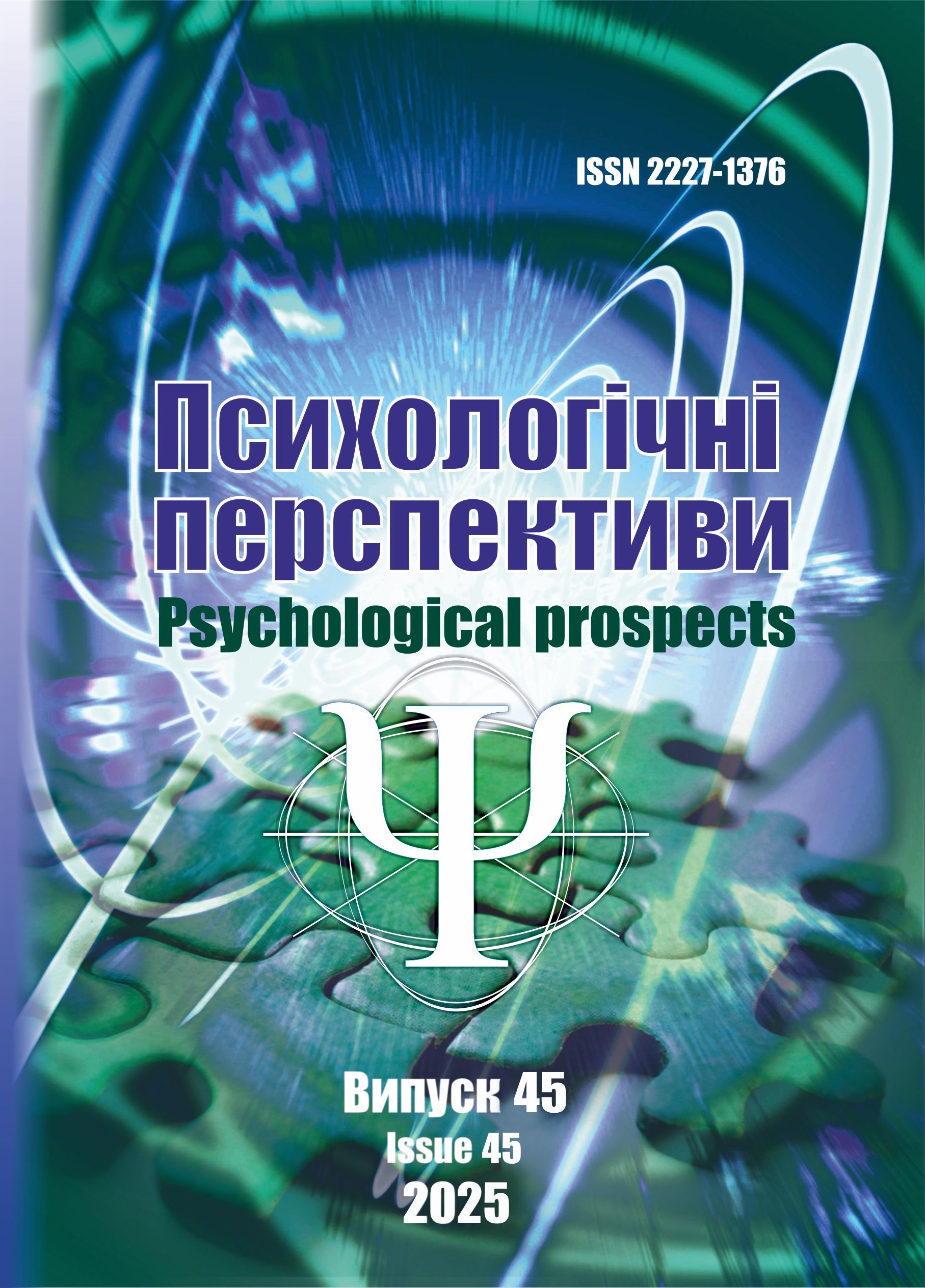Pathological aspects of family dynamics: a psychophysiological approach
DOI:
https://doi.org/10.29038/2227-1376-2025-45-hryKeywords:
family, psychophysiological approach, pathopsychology, brain, family relations, negative childhood experienceAbstract
Purpose. To reveal the pathopsychological aspects of family dynamics, which allows for a deeper understanding of the psychological mechanisms of interaction in the family in the presence of pathological conditions. The article discusses a psychophysiological approach to the analysis of family relationships, which includes neuropsychological, psychoemotional and behavioral factors that influence the formation of dysfunctional interaction patterns. The main neurophysiological indicators that correlate with the level of stress and emotional tension of family members, as well as the impact of chronic psychoemotional exhaustion on interpersonal communication are determined.
Methods. Analysis of scientific literature on the topic.
Results. The article deals with the peculiarities of cognitive and emotional reactions in families with mental disorders, addictions or other pathological conditions. The relationship between emotion regulation disorders and the level of neurophysiological activity is analyzed, which allows to identify possible mechanisms of correction. The concept of integrative psychophysiological influence on the family system, which involves the use of complex methods of neuropsychological therapy, psychotherapeutic support and other psychotherapy techniques, is proposed. The results obtained are of practical importance for the development of effective programs of psychocorrection and support for families facing pathopsychological challenges, as well as for the formation of strategies for preventive work with families at risk. The use of the psychophysiological approach contributes to a deeper understanding of the relationship between biological, psychological, and social factors that affect family stability and the quality of life of its members.
Conclusions. The human brain is social by nature, and its structure and functioning are deeply rooted in the family and society as a whole. Understanding the capabilities and limitations of the human brain is an important step in the evolution of human consciousness. The life experience of a person affects the functioning and efficiency of the brain.
References
1. Vadziuk, S. N., Rodynskyi, O. H. (2020). Fiziolohichni terminy. Tlumachnyi slovnyk [Physiological terms. Explanatory dictionary]. Ternopil: Ukrmedknyha. [in Ukrainian].
2. Vlasenko, I. A., Reva, O.M. (2020). A model for preserving the psychological health of student youth in Ukraine [Model zberezhennia psykholohichnoho zdorovia studentskoi molodi v Ukraini]. Naukovyi visnyk Khersonskoho derzhavnoho universytetu – Scientific Bulletin of KSU Series Psychological Sciences, 3, 90–99. https://doi.org/10.32999/ksu2312-3206/2020-3-11 [in Ukrainian]. DOI: https://doi.org/10.32999/ksu2312-3206/2020-3-11
3. Vlasova, O. V. (2022). Modification, standardization and adaptation of the Adverse Childhood Experiences (ACE) questionnaire [Modyfikatsiia, standartyzatsiia ta adaptatsiia ankety nehatyvnoho dytiachoho dosvidu (ACE)]. Oftalmolohichnyi zhurnal – Ophthalmological Journal, 1, 63–72. [in Ukrainian]. DOI: https://doi.org/10.31288/oftalmolzh202216372
4. Havrylkevych, V. K., Kabashniuk, V. O. (2023). Psykhofiziolohiia [Psychophysiology]. Kyiv: Novyi Svit-2000. [in Ukrainian].
5. Ginher, S. (2021). Psykhoterapiia: 100 khybnykh uiavlen abo yak zrobyty svii vybir [Psychotherapy: 100 misconceptions or how to make your choice]. Kolomyia: Vik. [in Ukrainian].
6. Ginher, S. (2021). Psykhoterapiia: mystetstvo stosunkiv [Psychotherapy: the art of relationships]. Chernivtsi: Vartykivtsi. [in Ukrainian].
7. Hrytsiuk, I. M. (2021). Psykhofiziolohiia [Psychophysiology]. Lutsk: Vezha-Druk. [in Ukrainian].
8. Hrytsiuk, I. M., Fedorenko, R. P., Mahdysiuk, L. I. (2022). Psykholohiia simeinykh vzaiemyn: teoriia ta praktyka [Psychology of family relationships: theory and practice]. Lutsk: Vezha-Druk. [in Ukrainian].
9. Kovalenko, A. B., Holota, V. H. (2022). The relationship between traumatic childhood experiences and personality tolerance in adulthood [Zviazok travmatychnoho dytiachoho dosvidu z tolerantnistiu osobystosti v doroslomu vitsi]. Ukrainian Psychlogical Journal, 1 (17), 41-63. [in Ukrainian]. DOI: https://doi.org/10.17721/upj.2022.1(17).3
10. Kozolino, L. (2022). Neirobiolohiia psykhoterapii [Neurobiology of psychotherapy]. Kyiv: «Dialektyka». [in Ukrainian].
11. Mikadze, Yu. V. (2022). Neiropsykholohiia dytiachoho viku. [Neuropsychology of childhood]. Kyiv: Vydavnytstvo Rostyslava Burlaky. [in Ukrainian].
12. Nakazava, D. Dzh. (2022). Ulamky dytiachykh travm. Chomu my khvoriiemo i yak tse prypynyty [The fragments of childhood trauma. Why we get sick and how to stop it.]. Kyiv: BookChef. [in Ukrainian].
13. Sapolski, R. (2022). Biolohiia povedinky. Prychyny dobroho i pohanoho v nas [The biology of behavior. The causes of good and bad in us]. Kyiv: Nash format. [in Ukrainian].
14. Serhieienkova, O. P., Stoliarchuk, O. A., Kokhanova, O. P., Pasieka, O. V. (2020). Vikova psykholohiia. [Age psychology]. Kyiv. Tsentr uchbovoi literatury. [in Ukrainian].
15. Tselikova, Yu. O. (2021). Negative childhood experience as a component of adult maladjustment [Nehatyvnyi dytiachyi dosvid yak skladova dezadaptatsii v doroslomu vitsi]. Multidisciplinární mezinárodní vědecký magazín “Věda a perspektivy” je registrován v České republice. SÉRIE “Psychologické vědy” Státní registrační číslo u Ministerstva kultury ČR: E 24142,. 7 (7), 253–264. [In Czech].
16. Forvard, S., Bak, K. (2022). Toksychni batky. [Toxic parents]. Kyiv: Svichado. [in Ukrainian].
17. Arden, J. (2023). Rewire Your Brain 2.0: Five Healthy Factors to a Better Life. John Wiley and Sons Ltd.
18. Anisman, H. (2021). Health Psychology: a Biopsychosocial Approach. Sage Publications.
19. Bandura, A. (2023). Social Cognitive Theory: An Agentic Perspective on Human Nature. John Wiley and Sons Ltd. DOI: https://doi.org/10.1002/9781394259069
20. Bowlby, J. (2022). A Book For Life. 10 steps to spiritual wisdom, a clear mind and lasting happiness. Yellow Kite.
21. Mushkevych, M., Mushkevych, V., Fedorenko, R., Duchyminska, T. & Mahdysiuk, L. (2024). The Relationship Between the Adaptive Capabilities of the Individual and the Risk of Suicidal Behavior in Modern Youth. Youth Voice Journal, 14(3), 140-149.
22. Cozolino, L. J. (2015). Why therapy works: Using our minds to change our brains. New York Norton.
23. Rokach, A. (2024). The Psychology of Health and Illness. London and New York: Taylor&Francis Group. DOI: https://doi.org/10.4324/9781032689012
24. Tselikova, Yu.O. (2020). The importance of parental attitude in negative childhoodexperience. Socialization & Human Development: International Scientific Journal, 2 (2), 135-143. DOI: https://doi.org/10.37096/SHDISJ-20-2.2-0010
25. Vertel, A. (2023). John Bowlby′s Attachment Theory as an Alternative to Psychoanalytic concepts of the early social-emotional development of a child. Sumy State Pedagogical University named after A. S. Makarenko, 2(31), 17-24. https://doi.org/10.33842/22195203-2024-02-15-2-31-17-24 DOI: https://doi.org/10.33842/22195203-2024-02-15-2-31-17-24
26. Young, J., Klosko, J., Weishaar, M. (2006). Schema Therapy: A Practitioner's Guide. A Self-Practice/Self-Reflection Workbook for Therapists. Guilford Press.
Downloads
Published
Issue
Section
License
Copyright (c) 2025 Iryna Hrytsiuk, Liudmyla Mahdysiuk, Antoniy Melnyk

This work is licensed under a Creative Commons Attribution-NonCommercial 4.0 International License.






